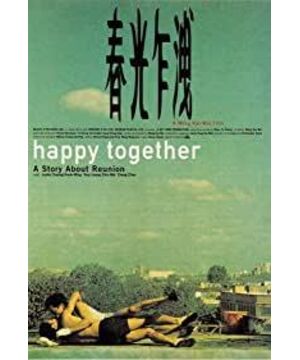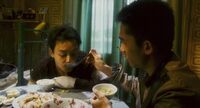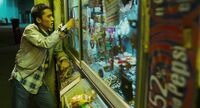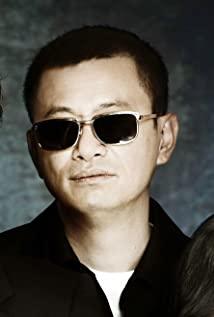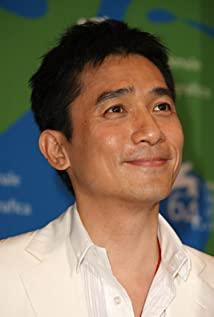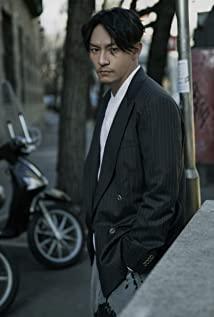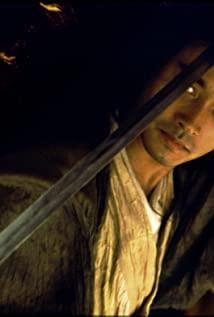They had lost their way to find this waterfall, quarreled because of getting lost, and parted ways and started over again when they met to meet again. This section is presented in black and white images, and the repression in silence is reluctant to talk.
The last three-quarters of the film are presented in color, especially in Li Yaohui's room, where the bright red and green contrast creates a huge visual gap. The lampshade painted with the magnificent waterfall, the dark green wallpaper, the powder blue square table, the geometric pattern tiles, even the phone, fake flowers, pillows, and even the cracks in the door have a great sense of design. As I have no talent for art, I can't explain the beauty of the pictures, the unique exotic atmosphere, and the order in chaos. Some people say that this film has achieved the ultimate in film aesthetics, which may have some truth. Du Kefeng won the Best Cinematography with it, Wong Kar Wai won the Best Director with it, and only lacked the art director Zhang Shuping. It can be said that without him, there would be no "Best of the Spring".
I don't know if the English title "Happy Together" is to express the current situation of the characters or the good expectations. I can't say for sure whether they are happy or not, but for sure, they are free people.
They practiced in the morning on the highway, danced in the communal kitchen in the afternoon, and had long conversations in the midnight room.
From the film, it is almost impossible to feel that the sun rises, the moon sets and the seasons alternate, because they live outside of time; nor do they feel the guidance of others on their lifestyle and attitude, because they live outside the mainstream values. .
There is a scene where Li Yaohui is cooking in a public kitchen. The landlord comes to urge a middle-aged female tenant to pay the rent. The two of them are arguing, and Li just leaves the kitchen with the cooked vegetables calmly, as if everything in this world is in turmoil. He can escape.
Their life is not strictly a vagabond, anyway, Li Yaohui has a serious job as a receptionist or a chef, and lives in a decent house. I think many people may say that the real wandering is spiritual, it is the wandering of the heart, a feeling of helplessness, not like Zhang Wan who appeared in the second half of the film, has a clear purpose, save enough Money, and then go to the next place, that is called tourism.
At least, it is certain that Li Yaohui is a lonely duckweed. He has experienced the ins and outs, quarrels or sweetness with He Baorong, and he has seen the majestic beauty of the world's widest Iguazu Falls. He left behind his own voice at the end of the world, and he also left the once beloved He Baorong in Argentina alone. When he saw the snack bar of Zhang Wan's house in downtown Taipei, he thought that if people want to wander happily, there must be a place where they can Back', have you found the meaning of travel? Where is he going next?
The film is cut from the perspective of Li Yaohui. He pursues freedom and leaves his hometown, but he longs for stability in his bones. I finally summoned up the courage to call my father in Hong Kong, but the words didn't make sense and I didn't know what to say. He couldn't pin his hopes on He Baorong, because He Baorong lived more freely. In fact, both of them are only controlled by emotions, and He Baorong's way of expressing his emotions is more straightforward. He can cheer recklessly after winning a horse bet, and he can return to Li Yaohui's residence and ask him to take care of him when he is injured. . On the other hand, Li's emotions were relatively suppressed, and he didn't say his joys, sorrows and sorrows, but it was written clearly on his face. He didn't know where he was going or what he wanted. Maybe that's why he's distressed, and one of the reasons why he's crying softly during the recording.
I don't know if this film is trying to explore another possibility in life while expressing a sense of uneasy drift. Many people may feel a sense of depression. After living these days, they are all trapped in time and region, in morality and mainstream values, in fame and money, and in the eyes of others. If we don't consider all these, where will we be, what will we do, will we be happy, lost or depressed, will we be like Li Yaohui?
His unease comes from his aimlessness. The waterfall was their destination, but the whole film was only about the waterfall for a few minutes, and the two never regarded it as an important thing. For him, nowhere is the end, nowhere is the beginning. So he couldn't say when he broke up like He Baorong: meet again, we will start over. He has no way back, no home to go back to. There is just a strong sense of belonging that has nowhere to go.
So is this film going to discuss the original human proposition of "where do we come from and where do we go"? It is said that Wong Kar-wai's films are very personal, so I am afraid that I will get the wrong idea, but he always has a lot of audiences who want to understand him but don't give an explanation, such as "In the Mood for Love" where all the dialogues are meaningless.
The sign of the tavern where Li Yaohui and Zhang Wan often go has been featured at least twice - AMIGOS, is it trying to explain that they are just friends, or that the people they meet in their lives are just passers-by, and there are feasts in the world, and He Baorong is just passing by He could not be with him for long.
Lin Xi wrote in the lyrics to the theme song of the same name for the movie: The more you look forward to it, the more beautiful it is. Let this night of spring be replaced, do you have to wait for the youth to wither to get everything. Do you want to explain that you should take advantage of your youth, this great time, to do what you want to do, and don't waste your time.
A certain shot near the end of the movie is a scene of people sweeping along the street in groups of three or five. They drink or chat, smoke or make noise. Under the dim yellow light, everyone is a similar figure, with similar faces, and there is one person. Looking back, he was Li Yaohui.
As soon as the camera turned, I took a panoramic view of the intersection from a high place. The lights were bright and the traffic was full of traffic. The background music was the cheerful "Happy Together". I couldn't tell whether it was Hong Kong, Taipei or Buenos Aires.
The story is not tortuous, the emotion is not strong, there is no vigorous life and death, and the characters are not heroes or villains, but passive, contradictory, a little confused and overwhelmed, he is one of us.
View more about Happy Together reviews


